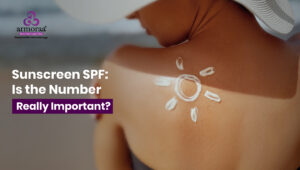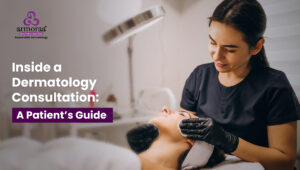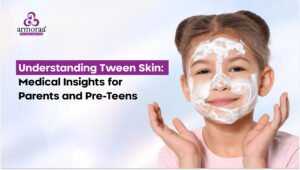Understanding Tween Skin: Medical Insights for Parents and Pre-Teens
As a board-certified dermatologist, I’ve noticed a significant shift in my practice over the past few years. More parents are bringing their 8-13-year-olds to my clinic—not always because of a specific skin problem, but because their children are anxious about skincare routines they’ve seen online. Social media has created both awareness and confusion about tween skincare, and I want to provide you with evidence-based guidance to navigate this landscape.
The Medical Reality of Tween Skin
In my years of practice, I’ve observed that tweens represent a unique patient population.
They’re positioned at the intersection of childhood and adolescence, experiencing rapid physiological changes that affect their skin in specific ways.
During the tween years, several important changes occur:
Hormonal activation begins earlier than many parents realize—sometimes as early as age 9, even before visible signs of puberty appear. These hormonal shifts trigger the sebaceous glands to increase oil production, which can lead to the development of acne.
Psychological vulnerability peaks during these years. In my practice, I’ve seen how even mild acne can significantly impact a young person’s self-esteem and social confidence. Research in dermatological literature confirms that skin concerns during this developmental period can contribute to anxiety, depression, and social withdrawal if not properly addressed.
My Clinical Recommendations: The Essential Skincare Routine
Let me be clear: despite what you may see on social media, tweens do not need elaborate, expensive skincare routines. In fact, overcomplicated regimens can do more harm than good.
For most of my tween patients, I recommend a simple three-step approach.
The Morning Routine
Step 1: Gentle Cleansing Use a mild, fragrance-free cleanser with a pH close to the skin’s natural level (around 5.5). I often recommend products containing ceramides or gentle surfactants that clean without stripping the skin’s protective barrier
Step 2: Lightweight Moisturization Apply a non-comedogenic, oil-free moisturizer appropriate for their skin type. Look for ingredients like:
• Hyaluronic acid (for hydration)
• Niacinamide (helps regulate oil production and reduces inflammation)
• Ceramides (support barrier function)
• Cytobiol iris
Step 3: Sun Protection This is non-negotiable in my practice. Apply a broad-spectrum sunscreen with SPF 30 minimum. Choose non-comedogenic formulations.
The Evening Routine
Step 1: Cleansing Remove the day’s accumulation of oil, dirt, environmental pollutants, and any makeup or sunscreen.
Step 2: Moisturizing Reapply a lightweight moisturizer to maintain barrier integrity overnight. That’s the foundation. Additional treatments should only be added when medically indicated.
Products and Ingredients I Do NOT Recommend for Tweens
In my clinic, I regularly see tweens who’ve developed irritation, barrier damage, or worsening acne from using age-inappropriate products. Here’s what I advise avoiding:
Retinoids and Retinol Products
Unless your treating dermatologist have prescribed them for specific medical conditions, tweens should not use:
• Over-the-counter retinol serums
• Retinaldehyde products
• Prescription-strength tretinoin (unless prescribed for acne)
These are powerful medications that can cause significant irritation in young skin and are simply unnecessary for healthy tween skin.
High-Concentration Exfoliating Acids
While I may recommend gentle salicylic acid for acne-prone patients, I don’t support the use of high concentration peels and at-home chemical peel formulations.
“Anti-Aging” Products
This concerns me greatly. I’ve seen 11-year-olds in my office asking about anti-aging serums. Tweens have naturally healthy collagen production and don’t need:
• Anti wrinkle creams
• Firming serums
• Peptide treatments
Fragranced and Irritating Products
Avoid products with:
• Added fragrances (synthetic or natural)
• High alcohol content
• Essential oils in high concentrations
• Harsh physical scrubs
The Psychological Dimension: Treating More Than Just Skin
In my years of practice , I’ve learned that treating tween skin issues goes far beyond prescribing creams and medications. The emotional impact of acne or other skin concerns during these formative years can be profound and long-lasting. I’ve seen confident children become withdrawn and anxious because of a few pimples. I’ve watched tweens compare themselves to filtered Instagram images, developing unrealistic expectations about what “normal” skin should look like. The academic pressure, social dynamics, and now the added burden of social media have created a perfect storm for skin-related anxiety in this age group.
My Holistic Approach to Tween Care
Every consultation in my clinic includes:
• Emotional Acknowledgment – I never dismiss a tween’s concerns as “just a phase.” If it matters to them, it matters clinically. Even mild acne can significantly impact their school experience, friendships, and self-image.
• Reality Check on Social Media – We have frank discussions about filters, photo editing, and how influencer skin is rarely as flawless as it appears. Understanding this helps reduce the pressure they feel.
• Realistic Timelines – I’m transparent about treatment expectations. Acne doesn’t clear overnight, and patience is part of the healing process. Setting realistic goals prevents disappointment and treatment abandonment.
• Behavioral Screening – I watch for warning signs of skin picking, excessive mirror checking, or obsessive skincare behaviors that may indicate deeper psychological concerns requiring additional support.
• Family Dynamics – I involve parents as partners while respecting the tween’s growing need for autonomy. This balance is crucial for treatment adherence and emotional wellbeing.
Addressing these psychological aspects early prevents the cascade of low self-esteem, social anxiety, and depression that untreated skin concerns can trigger. In my experience, when we treat both the skin and the emotional impact, outcomes improve dramatically.
Guidance for Parents: Your Role in Healthy Skincare
I often counsel parents on how to support their tween’s skincare journey without creating anxiety or obsession.
What I Recommend to Parents
• Educate Without Overwhelming Help your child understand the basic biology of why their skin is changing. This demystifies the process and reduces anxiety.
• Model Healthy Attitudes Your relationship with your own appearance influences your child.
Avoid:
-Negative comments about your own skin or body
-Obsessive skincare behaviors
-Unrealistic standards of “perfect” skin
• Monitor Social Media Influence Be aware of the skincare content your tween consumes. Many influencers promote:
-Age-inappropriate products
-Unproven treatments
-Unrealistic results (often achieved through filters)
Help them develop critical thinking about these sources
Red Flags That Warrant Medical Evaluation
As a dermatologist, I want you to know when to seek professional help. Schedule an appointment if you notice:
Skin Changes:
• Sudden or severe acne outbreaks
• Persistent rashes or lesions
• Changes in existing moles or new concerning growths
• Excessive oiliness or dryness unresponsive to basic care
• Fungal infections or unusual texture changes
• Development of scarring or significant post-inflammatory changes
Behavioral Concerns:
• Skin picking or excoriation
• Excessive time spent on skincare (possible obsessive behaviors)
• Significant emotional distress related to appearance
• Social withdrawal due to skin concerns
My Final Thoughts: Simplicity and Science
After years of practice, I can confidently say that the best skincare routine for tweens is one that’s simple, consistent, and evidence-based. Young skin doesn’t need transformation—it needs protection and gentle care. The skincare industry has created a sense that elaborate routines are necessary, but the science doesn’t support this for healthy tween skin.
If you have concerns about your tween’s skin or questions about appropriate products, I welcome you to schedule a consultation. Together, we can develop a personalized approach that supports healthy skin and confidence during these important developmental years.
Dr.Monisha Aravind, MD DVL
Chief Consultant and Medical Director
Armoraa Skin , Hair and Laser Clinic
The information provided in this article is intended for educational purposes and does not replace individualized medical evaluation and treatment. Please schedule an appointment for personalized recommendations.




